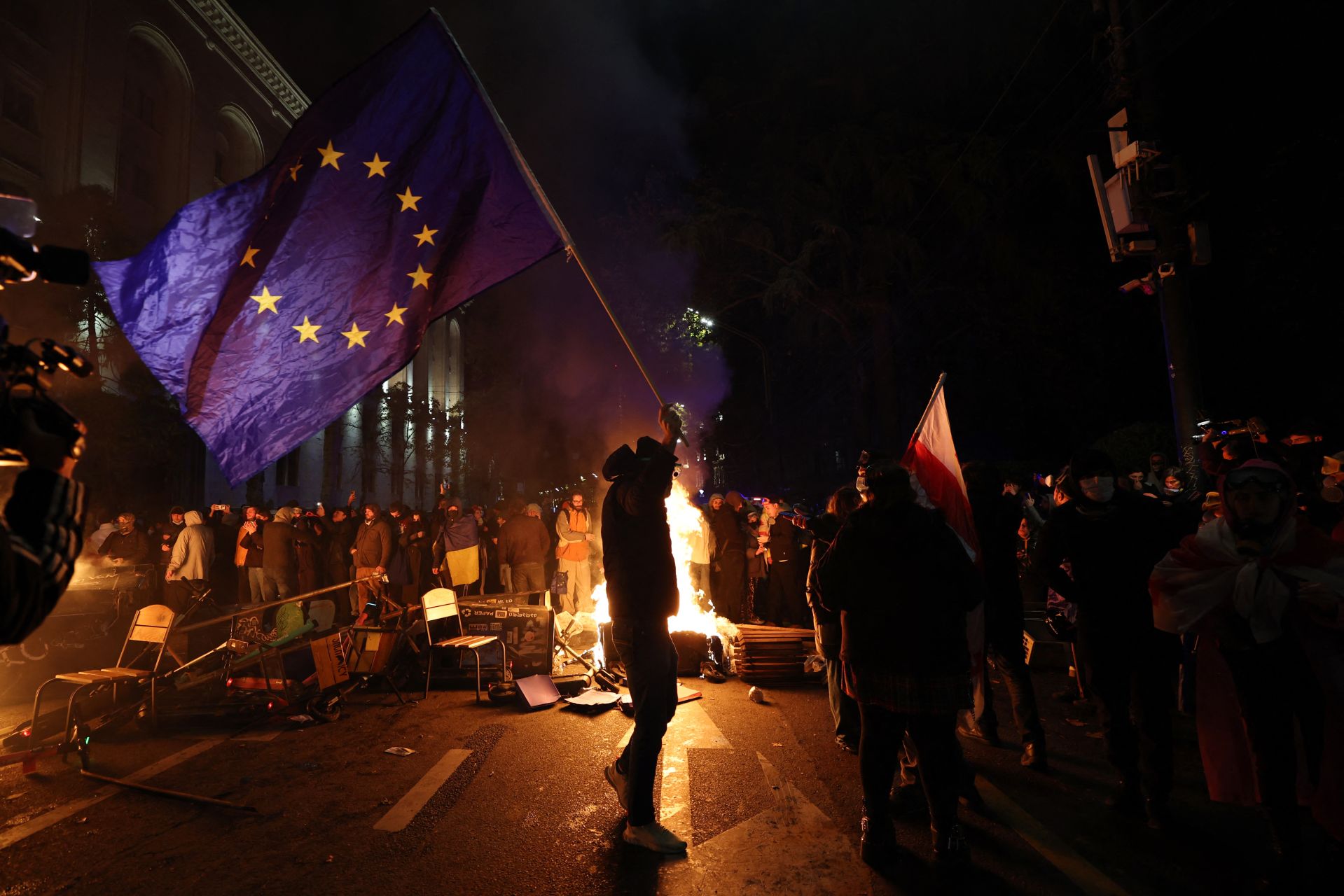- Home
- Middle East
- Police in Georgia Arrest Dozens in Clash With Pro-EU Protesters

A man holds a European Union flag as people protest near the Parliament building in opposition to the government's decision to delay European Union (EU) accession negotiations until 2028 in downtown Tbilisi on November 28, 2024 ©Giorgi ARJEVANIDZE / AFP
Police in Georgia arrested dozens of people overnight and early Friday in a violent crackdown on protests against the government's decision to delay EU membership talks.
The Black Sea nation has been rocked by turmoil since the ruling party declared victory in October parliamentary elections that the pro-EU opposition decried as falsified.
On Thursday night and Friday morning, riot police deployed rubber bullets, tear gas and water cannons to disperse gatherings outside parliament in Tbilisi, beating peaceful protesters and journalists, an AFP reporter witnessed.
The interior ministry said 32 of its staff were injured and "43 individuals were detained by law enforcement for disobeying lawful police orders and for petty hooliganism".
Thousands of people took the streets after Prime Minister Irakli Kobakhidze of the ruling Georgian Dream party announced the Caucasus country would not pursue membership of the European Union until 2028.
The opposition has accused Georgian Dream of steering Tbilisi away from its long-held dream of joining the bloc and gravitating towards Russia.
Two politicians from the opposition Coalition for Change, Elene Khoshtaria and Nana Malashkhia, were reportedly injured during the protests.
Khoshtaria sustained a broken arm, while Malashkhia suffered a broken nose, the coalition said.
Prominent poet Zviad Ratiani was among those arrested, the PEN writer's association in Georgia said, demanding his immediate release.
Post-election crisis
Opposition lawmakers are boycotting the new parliament, while Georgia's pro-EU president Salome Zurabishvili has sought to annul the election results through the country's constitutional court.
The prime minister's announcement to delay EU accession came hours after the European Parliament adopted a non-binding resolution rejecting the results of Georgia's October 26 elections, alleging "significant irregularities".
The resolution called for a new vote within a year under international supervision and for sanctions to be imposed on top Georgian officials, including Prime Minister Kobakhidze.
Accusing the European Parliament of "blackmail", Kobakhidze said: "We have decided not to bring up the issue of joining the European Union on the agenda until the end of 2028."
But he pledged to continue implementing reforms, saying: "By 2028, Georgia will be more prepared than any other candidate country to open accession talks with Brussels and become a member state in 2030."
On Thursday, Georgian Dream MPs voted unanimously for Kobakhidze to continue as prime minister.
But constitutional law experts say any decisions made by the new parliament are invalid, because it is still awaiting a court ruling on Zurabishvili's bid to annul the election results.
On Wednesday, the ruling party nominated far-right politician and former football international Mikheil Kavelashvili for the largely ceremonial post of president, further ratcheting up tensions.
The former Soviet country officially gained EU candidate status in December 2023, an aspiration that is supported by 80 percent of the population, according to polling.
But earlier this year Brussels froze Georgia's accession process, citing the need for Tbilisi to address what it says is democratic backsliding.
The Council of Europe
The Council of Europe condemned on Friday the crackdown on pro-European demonstrations in Georgia, where clashes with law enforcement left several injured on Thursday night.
Georgia is a member of the Council of Europe, an institution comprising 46 member states tasked with upholding democracy and human rights across the continent.
Meeting in Luxembourg, the Standing Committee of the Parliamentary Assembly of the Council of Europe (PACE) strongly condemned "the brutal repression of peaceful protests that took place in Tbilisi (...) as a violation of the fundamental rights to freedom of expression and assembly."
In a statement, the Council emphasized that "most of the protesters were arrested and charged under provisions of the controversial Soviet-era Code of Administrative Offenses," which the Council has previously called for to be abolished.
AFP
Read more



Comments